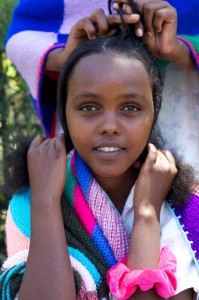We arrive in his village, Gulett, a few hours away, and my mind is so far elsewhere. How can I leave this enchanting land? Maybe I should strop right now and turn back. What if at some point I won’t be able to?
We enter his compound and are greeted by his 87 year old “Mama”, his great grandmother, followed by “Imiyea”, his grandmother who raised him after his mother died when he was ten years old. It is love at first sight. Words are not needed to hold someone’s face, look deeply into their eyes, your own eyes filled to the brim with tears, and communicate feelings of joy for this chance meeting.
We visit for awhile, eat some gonfo, they teach me how to catch a goat, and I try to say something each time Mama tells me to “just say something”. I wish I knew more Amharic, but she settles for the few words I know. We decide to take a walk before dinner and Danny leads the way over unpaved roads filled with large rocks, gently watching my stance so he can quickly right my fall should that begin to occur.
We come to an area that looks like paradise decided to drop some magic. I find out that Danny’s friends decided to pool their resources about three years ago, taking a stretch of incredibly unattractive land and making it into a lovely garden with pathways lined with beautiful plants and flowers. Small tables are set up so people can enjoy coffee (best I have had in Ethiopia so far!) and conversation.
They show me one structure that is not yet complete and tell me they are building a “Couple’s House”. Apparently, if two people spend time together and after much dialog decide to culminate their relationship, they can enter the Couple House. If they do enter this house, marriage plans will follow.
As I sit there marveling at the storybook feel to the day so far, a small boy around the age of seven comes up to our table and begins to dance the moon walk and many other dance moves that Michael Jackson so flawlessly perfected. I clap my hands, excitement building as his moves get more complicated. Dear Mother Sky…am I in heaven?
One of Danny’s friends starts to move his hands wildly in front of Fetena’s face and I realize this little boy is deaf. How can he feel the rhythm to be able to dance like this? I ask where the men learned sign language and my question is met with a shy smile. It is “just natural sign language”, they relay to me. And they go on to talk with Fetena about trips to Addis, how his mother might feel, what they need him to do, how they feel. I try to catch a glimpse of a gesture I can understand and it is impossible. I fall in love with both of them. Like real love, the kind that makes you feel a bit twisted inside, and safe, like there is no end of it in sight. Ever.
I capture Fetena’s dance on video, and he commands the camera with intensity. My heart stretches to the moon, and I look up to see everyone watching my joy. I cry. I cry for Danny’s life without a mother. I cry for this little boy who has not let his deafness keep him from feeling and expressing rhythm. I cry because this marvelous little boy is very poor and has to beg others for food. I cry for anyone who has never felt love like this. I cry because I feel so deeply.
Danny tells me it is time to walk a bit more, and a short way down the road I see a woman looking out of her window, head perched comfortably as though she spends much time watching the activities surrounding her house on a daily basis. Danny relays to me that indeed she is there all day, and she is blind. Yet she looks like she is watching every move passing by.
I call this village “Magic Village” and I truly feel like I have dropped into my childhood’s most desirable dream village. And oh how I love it. When Mama says she will adopt me into her family, I feel a sense of peace rush over me, knowing I will never leave this village.



































